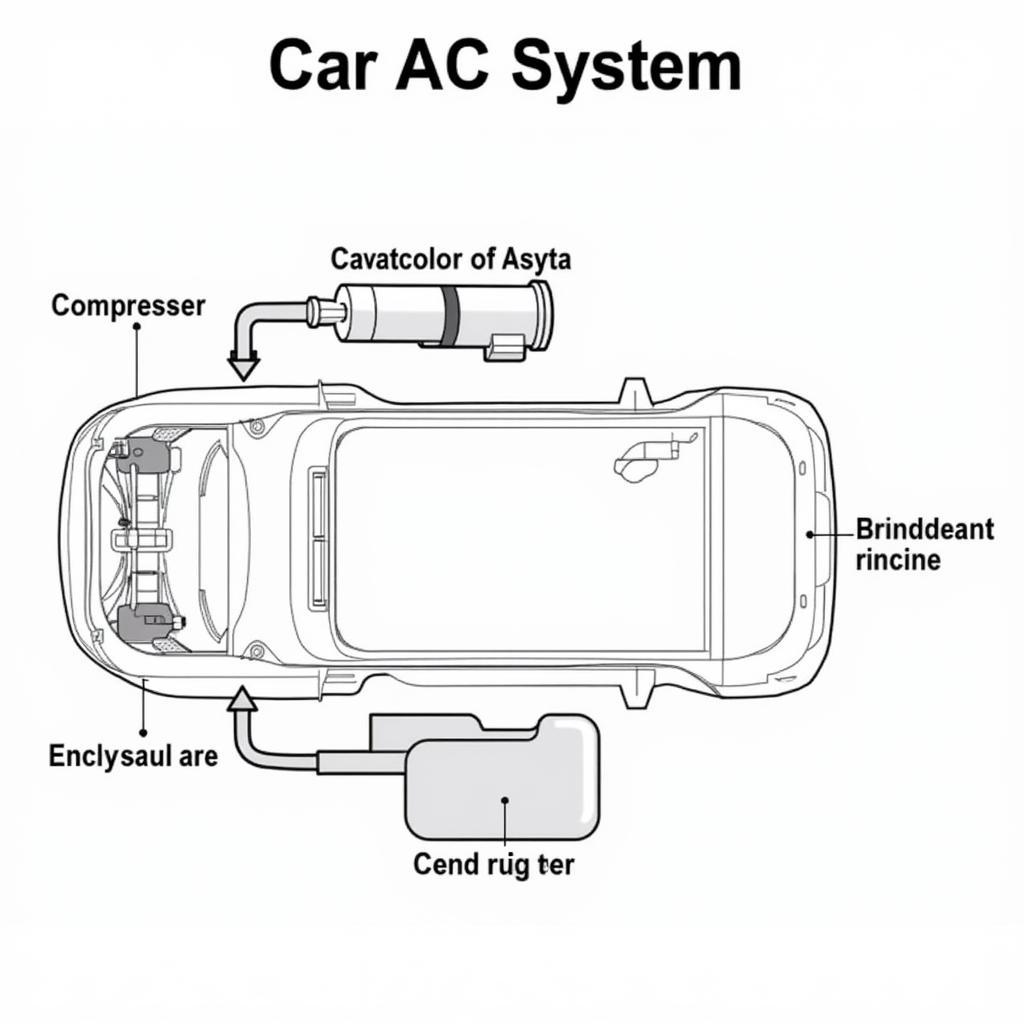Experiencing warm air blasting from your car’s AC vents on a scorching summer day can be incredibly frustrating. While there are numerous reasons why your car AC might be malfunctioning, one common culprit is high system pressure. In this comprehensive guide, we will delve deep into the intricacies of car AC high pressure issues, providing you with the knowledge to diagnose, troubleshoot, and potentially fix the problem yourself.
Understanding Car AC Systems and Pressure
Before we jump into the nitty-gritty of high AC pressure, it’s crucial to grasp the basics of how your car’s AC system operates. In essence, your car’s AC system works like a refrigerator, utilizing a specialized refrigerant to absorb heat from the cabin and release it outside. This refrigerant circulates through various components, including a compressor, condenser, evaporator, and expansion valve, each playing a critical role in maintaining optimal pressure and facilitating efficient cooling.
 Car AC System Diagram
Car AC System Diagram
What Causes High AC Pressure in Cars?
High pressure in your car AC system is often a symptom of an underlying issue rather than a problem in itself. Several factors can contribute to this, and identifying the root cause is crucial for effective repair.
1. Overcharged AC System
One of the most prevalent reasons for high AC pressure is an overcharged system. If your AC system has been recently recharged, there’s a chance it might have received too much refrigerant. Excessive refrigerant disrupts the delicate pressure balance within the system, leading to elevated pressure readings.
2. Clogged Condenser or Lines
Your car’s AC condenser, located at the front of the vehicle, plays a crucial role in cooling the refrigerant. Over time, debris, dirt, and bugs can accumulate on the condenser fins, restricting airflow and hindering heat exchange. Similarly, refrigerant lines can become partially or fully clogged, impeding refrigerant flow and causing pressure to build up.
 Clogged AC Condenser
Clogged AC Condenser
3. Faulty Cooling Fan
The cooling fan, often mounted directly to the condenser, helps draw air through the condenser fins, facilitating efficient heat dissipation. A malfunctioning cooling fan, whether due to a faulty motor, damaged wiring, or a blown fuse, can significantly reduce airflow, causing the condenser to overheat and elevate system pressure.
4. Expansion Valve Issues
The expansion valve acts as a gatekeeper, regulating the flow of refrigerant into the evaporator. A malfunctioning or stuck expansion valve can disrupt the refrigerant flow, leading to pressure imbalances. If the valve restricts refrigerant flow, it can cause high pressure on the condenser side.
Diagnosing Car AC High Pressure
Accurately diagnosing the cause of high AC pressure requires a systematic approach and, in some cases, specialized tools.
1. Check Pressure Readings
A professional AC gauge set is essential for accurately measuring the pressure in your car’s AC system. The gauges will indicate both the high-side and low-side pressures, providing valuable insights into the system’s health. Always refer to your vehicle’s service manual for the recommended pressure range.
2. Inspect the Condenser and Cooling Fan
Visually inspect the AC condenser for any signs of blockage, debris accumulation, or damage. Check if the cooling fan is operational and spins freely when the AC is turned on. You can also listen for any unusual noises coming from the fan motor.
3. Consider Professional Diagnosis
If you are uncomfortable working with AC systems or lack the necessary tools, it’s best to consult a qualified mechanic specializing in automotive air conditioning. They have the expertise and equipment to diagnose and repair complex AC issues accurately.
Potential Solutions for High Car AC Pressure
The solution for high AC pressure depends entirely on the underlying cause. Here are some potential fixes:
1. Refrigerant Recovery and Recharge
If the system is overcharged, a qualified technician can safely recover the excess refrigerant and recharge the system to the manufacturer’s specifications.
2. Condenser Cleaning or Replacement
Cleaning a mildly clogged condenser can often be done using compressed air or specialized cleaning solutions. However, severely damaged or blocked condensers might require replacement.
3. Cooling Fan Repair or Replacement
Troubleshooting cooling fan issues involves checking the fan motor, wiring, and related components. Depending on the diagnosis, you might need to repair or replace the fan motor, wiring harness, or the entire cooling fan assembly.
4. Expansion Valve Replacement
A faulty expansion valve typically necessitates replacement. This task is best left to a qualified mechanic as it requires specialized tools and expertise.
How to Prevent High AC Pressure in Cars
Preventing high AC pressure involves proactive maintenance and addressing minor issues before they escalate into major problems.
- Regular AC Service: Schedule annual AC checkups to ensure optimal refrigerant levels and system performance.
- Keep the Condenser Clean: Regularly clean the AC condenser by removing any debris, leaves, or dirt using a gentle stream of water or compressed air.
- Address Leaks Promptly: If you suspect an AC refrigerant leak, address it promptly by consulting a qualified technician. [how to fix car ac refrigerant leak](https://autotippro.com/how to fix car ac refrigerant leak/)
Conclusion
High AC pressure in your car can be a major inconvenience, especially during hot weather. By understanding the common causes, symptoms, and potential solutions outlined in this guide, you’ll be well-equipped to tackle this issue head-on. Remember, regular maintenance and timely repairs are key to keeping your car’s AC system running smoothly and ensuring a comfortable ride in any weather.
For expert assistance with your car AC or any other automotive needs, feel free to contact AutoTipPro at +1 (641) 206-8880 or visit our office at 500 N St Mary’s St, San Antonio, TX 78205, United States. Our team of certified technicians is here to provide you with top-notch service and keep your vehicle in pristine condition.
FAQs
1. Can I drive my car with high AC pressure?
It’s not advisable to drive your car with high AC pressure for extended periods. Doing so can put excessive strain on the system, potentially leading to compressor failure or other costly damages.
2. How often should I recharge my car’s AC system?
While some minor refrigerant loss over time is normal, your car’s AC system should not require frequent recharging. If you find yourself recharging the system every year, it’s crucial to have it inspected for leaks.
3. How can I tell if my AC condenser is clogged?
A severely clogged condenser will often result in noticeably reduced cooling performance. You might also notice warm air blowing from the vents even when the AC is set to the coldest setting.
4. Can I use a garden hose to clean my AC condenser?
While a garden hose can remove loose debris, it’s best to use a gentle stream of water or compressed air to avoid damaging the delicate condenser fins.
5. How much does it cost to replace a car AC compressor?
The cost of replacing a car AC compressor varies depending on the make and model of your vehicle. On average, you can expect to pay between $500 and $1,200 for parts and labor.




Leave a Reply